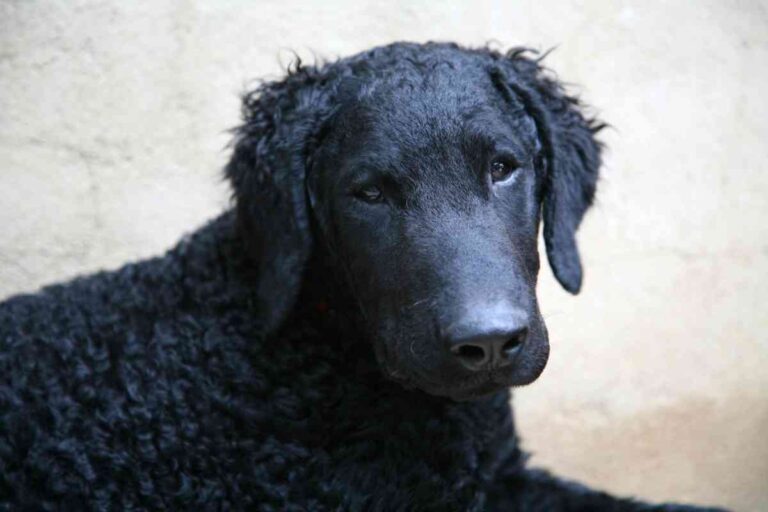Labrador Retrievers in Cold Climates: Tips for Keeping Your Pup Warm and Safe
Labrador Retrievers are a popular breed of dog known for their friendly and outgoing personalities. They are also known for their thick, water-repellent coats, which make them well-suited for cold climates. However, it is important for owners to understand the specific needs of their Labrador in cold weather to ensure their health and happiness.
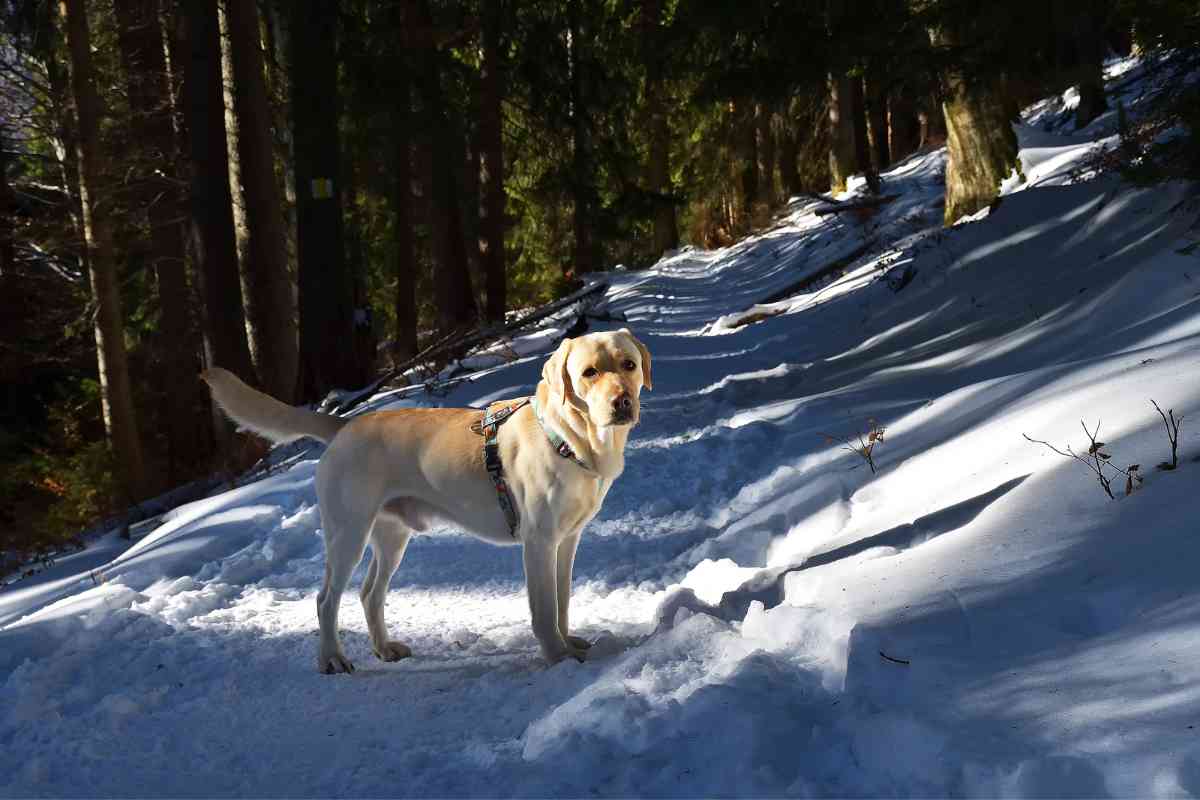
How do Labradors do in cold climates?
While Labrador Retrievers can tolerate colder temperatures than some other breeds, they still require proper shelter and exercise in cold weather. Canadian Labrador Retrievers, for example, are bred to work in cold climates and have a thicker coat than their non-Canadian counterparts. However, individual dogs may have different tolerances for cold temperatures, so it is important to pay attention to your dog’s behavior and adjust accordingly.
In this article, we will explore the topic of Labrador Retrievers in cold climates and provide tips for keeping your furry friend healthy and happy in chilly weather.
Labrador Retrievers and Cold Climates
History of Labrador Retrievers
Labrador Retrievers originated in Newfoundland, Canada, where they were bred to assist fishermen in retrieving fish that had fallen off hooks and nets.
These dogs were also used to pull carts of fish and supplies, and to help with hunting. Due to their working environment, Labrador Retrievers were bred to be hardy and able to withstand cold and icy conditions.
Labrador Retriever Breed Characteristics
Labrador Retrievers are well-suited to colder temperatures due to their thick, water-resistant coat and their love of swimming. However, like all dogs, they have different temperature tolerance levels, and some may be more sensitive to cold than others.
Canadian Retrievers, for instance, have a much thicker coat compared to their non-Canadian counterparts due to their breeding history.
If you live in a cold climate and own a Labrador Retriever, it’s important to monitor your dog’s exposure to cold weather. While they are hardy dogs, over-exposure to icy environments can cause hypothermia or frostbite. You should take your pet inside if the temperature drops below 20 °F (-7 °C).
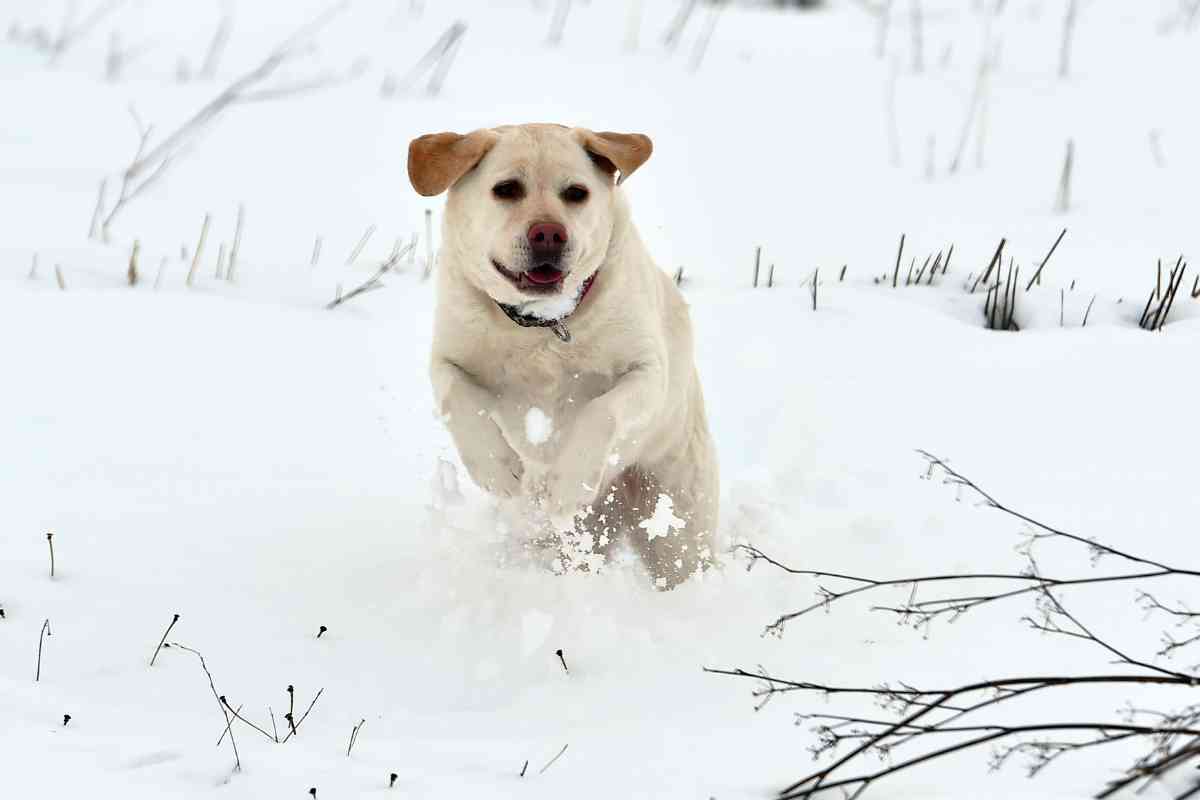
To help keep your Labrador Retriever warm and comfortable in colder temperatures, consider the following:
- Winter Coats: Labradors may need extra insulation to stay warm in cold weather. Look for a coat that fits snugly, covers the torso and neck, and is made of material that repels moisture.
- Boots: Protecting your Labrador’s paws from cold surfaces, ice, and snow is crucial in winter weather.
- Indoor Shelter: Provide your Labrador with a warm and dry place to rest indoors, away from drafts.
In conclusion, Labrador Retrievers are a hardy breed that is well-suited to colder temperatures, but it’s important to monitor their exposure to cold weather and provide them with the necessary protection and shelter to keep them safe and comfortable.
Factors Affecting Labrador Retrievers in Cold Climates
When it comes to Labrador Retrievers and cold climates, it’s important to consider several factors that can affect their well-being. Here are some of the most important factors to keep in mind:
Temperature Tolerance
Labrador Retrievers are generally well-suited to cold weather thanks to their thick, water-resistant coats. However, it’s important to remember that every dog is different.
Some Labradors may have a higher tolerance for cold temperatures than others, depending on factors like their age, weight, and health condition.
Coat and Cold Weather
As mentioned, Labrador Retrievers have thick, water-resistant coats that help to protect them from the cold. However, it’s important to keep their coats clean and well-groomed to ensure that they can regulate their body temperature effectively.
Mats and tangles in their fur can trap moisture, which can make them feel colder and increase their risk of hypothermia.
Age and Health Condition
Older Labradors and those with health conditions like arthritis, diabetes, or heart disease may have a harder time regulating their body temperature in cold weather.
It’s important to monitor them closely and take steps to keep them warm and comfortable, such as providing them with a warm bed or coat.
Weight
Labrador Retrievers come in a range of sizes, from small to large. Generally speaking, larger dogs tend to be better suited to cold weather than smaller dogs, as they have more body mass to generate heat. However, it’s important to remember that every dog is different and to monitor their behavior closely in cold weather.
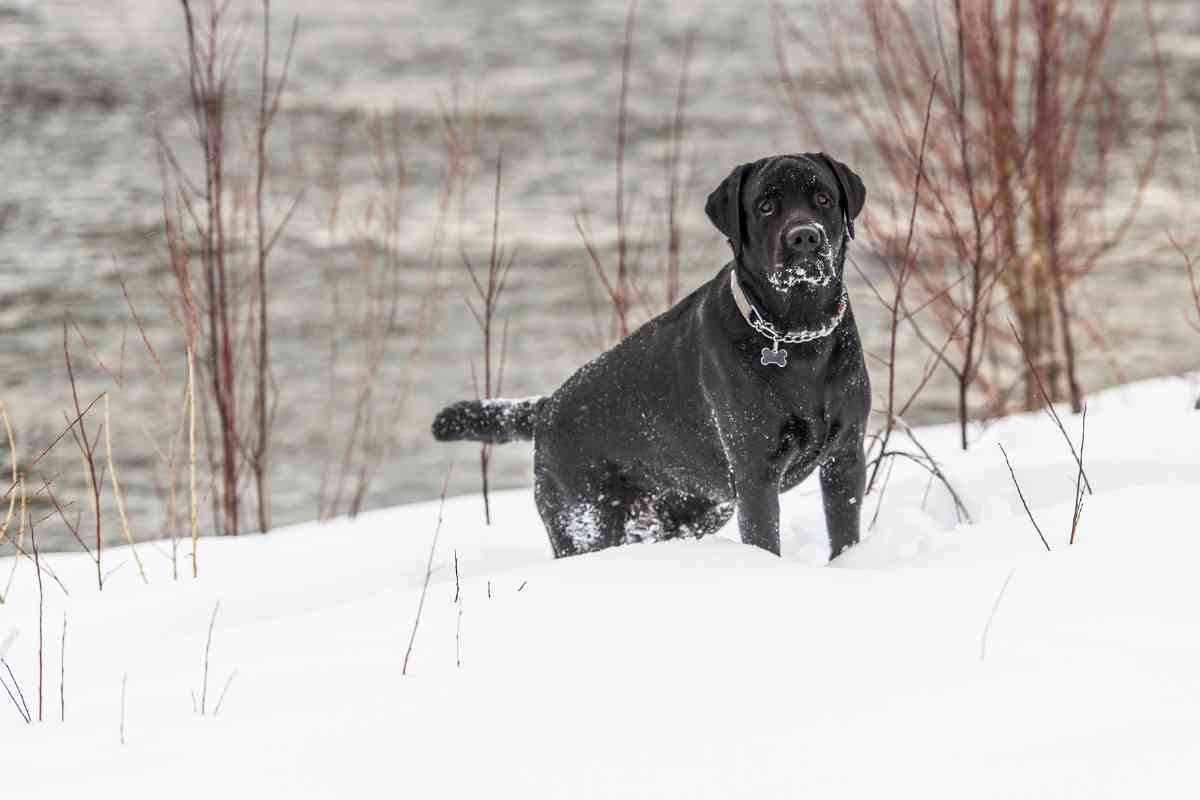
Labrador Retriever’s Energy Level
Labrador Retrievers are known for their high energy levels, which can make them more resistant to cold weather. However, they can still get cold, so provide them with plenty of opportunities to warm up, such as by running around or playing indoors.
By keeping these factors in mind and taking appropriate steps to keep your dog warm and comfortable, you can help ensure that they stay healthy and happy in cold climates.
Cold Weather Activities for Labrador Retrievers
Labrador Retrievers are known for their love of outdoor activities, and cold weather should not stop them from having fun. As long as you take the necessary precautions to keep them safe and warm, your Lab can enjoy various activities during the winter months.
Walks and Exercise
Taking your Lab for a walk or run is a great way to keep them active and healthy during the winter. However, you need to be mindful of the weather conditions and adjust your routine accordingly.
Here are some tips to keep in mind:
- Dress your Lab in a coat or sweater to keep them warm
- Avoid walking on icy or slippery surfaces to prevent injuries
- Shorten the duration of walks or exercise sessions if it’s too cold outside
- Keep your Lab hydrated by bringing fresh water with you
Swimming and Water Activities
Labrador Retrievers are excellent swimmers, and they can enjoy water activities during the winter if the conditions are safe.
However, you need to be extra careful when it comes to cold water. Here are some tips to keep in mind:
- Make sure the water is not too cold for your Lab to swim in
- Dress your Lab in a waterproof coat or sweater to keep them warm
- Dry your Lab thoroughly after swimming to prevent hypothermia
- Monitor your Lab’s behavior and take breaks when needed to let them rest and catch their breath
Working Dogs in Cold Climates
Labrador Retrievers are working dogs, and they can perform various tasks in cold climates. However, you need to take extra precautions to keep them safe and healthy. Here are some tips to keep in mind:
- Dress your Lab in appropriate gear for the task at hand, such as a vest or harness
- Keep your Lab hydrated and well-fed during the workday
- Take breaks when needed to let your Lab rest and warm up
- Monitor your Lab’s behavior for signs of fatigue or discomfort
In conclusion, Labrador Retrievers can enjoy various activities during the winter months, as long as you take the necessary precautions to keep them safe and warm. Whether it’s walking, swimming, or working, your Lab can have fun and stay healthy in cold climates.
Protecting Labrador Retrievers in Cold Climates
Labrador Retrievers are known for their thick, water-repellent coat, which makes them well-suited to cold climates.
However, even with their natural insulation, it is important to take certain precautions to ensure your furry friend stays healthy and comfortable during the winter months.
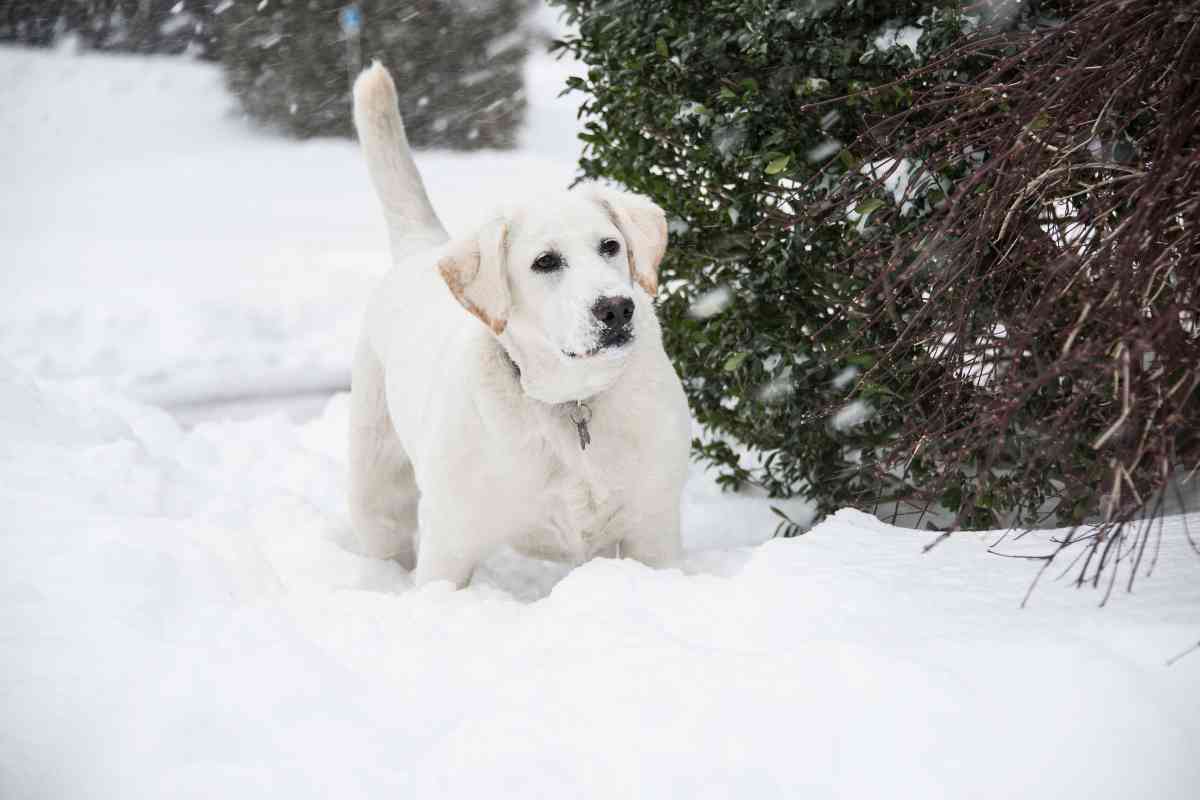
Winter Coats and Jackets
While Labradors have a double coat that provides insulation, some may still benefit from an additional layer of protection in extremely cold temperatures.
Winter coats and jackets can help keep your dog warm and dry, especially during walks or outdoor activities. Look for coats that are made of waterproof or water-resistant materials, and that fit properly to avoid any discomfort or restriction of movement.
My dog loves wearing this winter coat I got for him on Amazon last winter.
Booties and Sweaters
In addition to coats, booties and sweaters can also provide extra protection from the cold. Booties can help protect your dog’s paws from snow, ice, and salt, which can be harmful and cause irritation.
Sweaters can help keep your dog’s body warm, especially if they have a short or thin coat. However, it is important to make sure the clothing fits properly and does not restrict movement or cause discomfort.
Proper Shelter and Bedding
Providing your Labrador with proper shelter is crucial during the winter months. A warm and dry shelter, such as a doghouse or insulated garage, can help protect your dog from the cold and wind.
Additionally, providing warm and comfortable bedding, such as blankets or a heated dog bed, can help keep your dog cozy and prevent hypothermia.
This one is great because you can use it indoors and outdoors, meaning you can take it outside with you in the snow and give your Labrador a chance to warm their paws without having to end playtime.
Fresh Water and Nutrition
It is important to ensure your Labrador has access to fresh, clean water at all times, even during the winter months.
Dehydration can still occur in cold weather, and your dog may need more water than usual if they are playing in the snow or engaging in outdoor activities. Additionally, providing your dog with a well-balanced diet can help support their immune system and keep them healthy during the winter months.
Veterinary Care
Regular veterinary care is important for all dogs, but especially during the winter months. Cold weather can exacerbate certain health conditions, such as arthritis, and your dog may be more susceptible to illnesses such as respiratory infections.
Additionally, it is important to monitor your dog’s body temperature and look for signs of hypothermia, such as shivering, lethargy, and pale gums. If you suspect your dog is experiencing hypothermia or any other health issue, seek veterinary care immediately.
In conclusion, while Labrador Retrievers are well-suited to cold climates, it is important to take certain precautions to ensure their health and comfort during the winter months. By providing proper shelter, clothing, nutrition, and veterinary care, you can help keep your furry friend happy and healthy all year round.
Health Concerns for Labrador Retrievers in Cold Climates
Labrador Retrievers are a breed that can tolerate cold climates quite well, thanks to their thick, water-repellent coat. However, exposure to cold weather can exacerbate or create certain health conditions that are common in Labradors.
Here are some of the health concerns that Labrador Retriever owners should be aware of when living in cold climates.
Hypothermia and Frostbite
Hypothermia occurs when a dog’s body temperature drops below normal. This can happen when a dog spends too much time outside in cold weather without proper shelter or protection. Symptoms of hypothermia include shivering, lethargy, and a slow heart rate. In severe cases, hypothermia can be life-threatening.
Frostbite is another concern for dogs in cold climates. It occurs when the skin and underlying tissues freeze due to prolonged exposure to cold temperatures. Frostbite is most common in the extremities, such as the ears, tail, and paws. Symptoms of frostbite include discoloration of the skin, blisters, and pain.
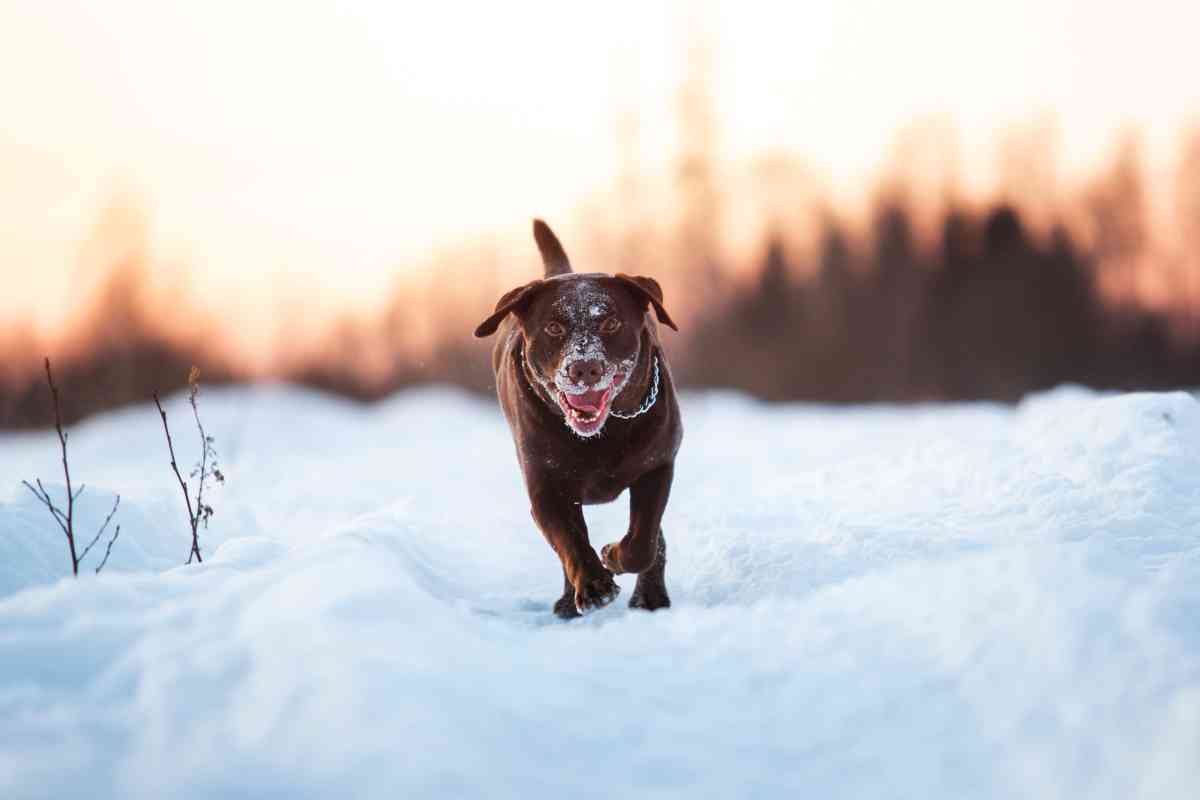
Arthritis and Joint Problems
Labrador Retrievers are prone to joint problems, such as hip dysplasia and arthritis. Cold weather can exacerbate these conditions, causing more pain and discomfort for the dog.
Owners should take extra care to keep their Labrador warm and comfortable during the winter months.
Dry Skin and Health Issues
Cold weather can also cause dry skin and other health issues in Labradors. Dry skin can lead to itching, flaking, and even infections.Additionally, cold weather can weaken a dog’s immune system, making them more susceptible to illnesses such as kennel cough.
To prevent these health issues, owners should provide their Labrador with proper shelter and protection during cold weather. This includes a warm, dry place to sleep, a coat or sweater to wear when outside, and regular grooming to prevent dry skin.
In summary, while Labrador Retrievers are well-suited to cold climates, owners should be aware of the potential health concerns that come with exposure to cold weather. By taking proper precautions and providing their dog with the necessary care, owners can help ensure their Labrador stays healthy and happy during the winter months.
Conclusion
In conclusion, Labrador Retrievers are well-suited to cold climates due to their thick water-repellent coat and hardy genetics. However, it is important to provide them with proper shelter and exercise to ensure their health and happiness.
While Labs do not need any added coat or sweater to be able to go outside and enjoy the snow or the weather, monitoring their comfort level during wintry adventures is crucial. It is also important to be aware of potential health concerns that can be exacerbated by exposure to cold weather, such as joint pain or arthritis.
Overall, with proper care and attention, Labrador Retrievers can thrive in cold climates and make wonderful companions for those who enjoy outdoor activities in the winter.
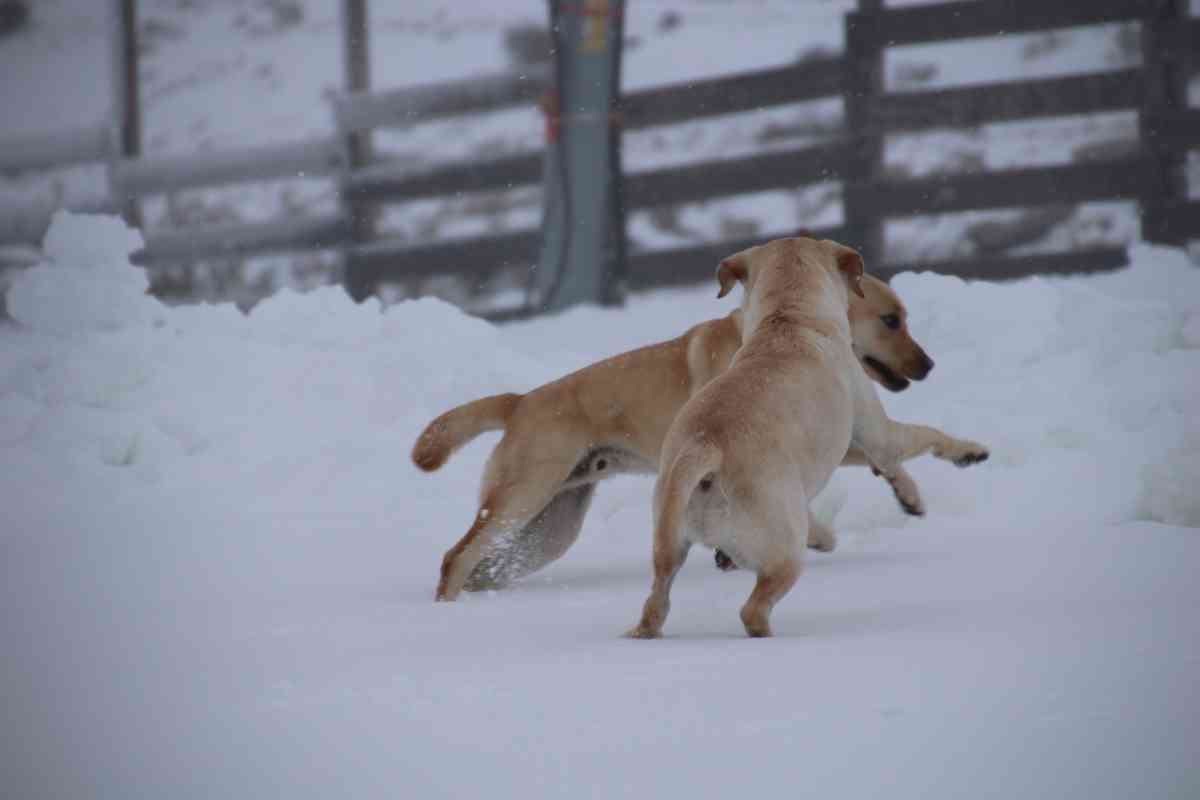
Resources
As a Labrador owner in a cold climate, it’s important to have resources available to ensure your dog’s health and happiness. Here are a few resources to consider:
American Kennel Club
The American Kennel Club (AKC) is a great resource for Labrador owners. They provide information on breed standards, health concerns, and training tips. They also have a list of reputable breeders and upcoming events, such as dog shows and obedience trials. Additionally, the AKC offers a Canine Good Citizen program, which can help your Labrador become a well-behaved and socialized member of your community.
Veterinarian
Regular visits to a veterinarian are essential for your Labrador’s health. In a cold climate, it’s important to monitor your dog’s weight, coat condition, and overall health. Your veterinarian can also provide advice on nutrition, exercise, and preventive care. They can also help you identify and treat any health issues that may arise.
Labrador Owners
Connecting with other Labrador owners can be a great resource. They can provide advice on training, grooming, and dealing with cold weather. You can find local Labrador clubs through the AKC or online. Social media groups and forums can also be a great way to connect with other Labrador owners and share information.
Fishing Industry
Labrador Retrievers were originally bred to assist fishermen in retrieving fish from the water. If you live in a cold climate near a fishing industry, consider reaching out to local fishermen for advice on caring for your Labrador in cold weather. They may have tips on keeping your dog warm and dry, as well as advice on water safety.
In conclusion, having resources available is essential for Labrador owners in cold climates. The American Kennel Club, veterinarian, other Labrador owners, and the fishing industry can all provide valuable information and support.








